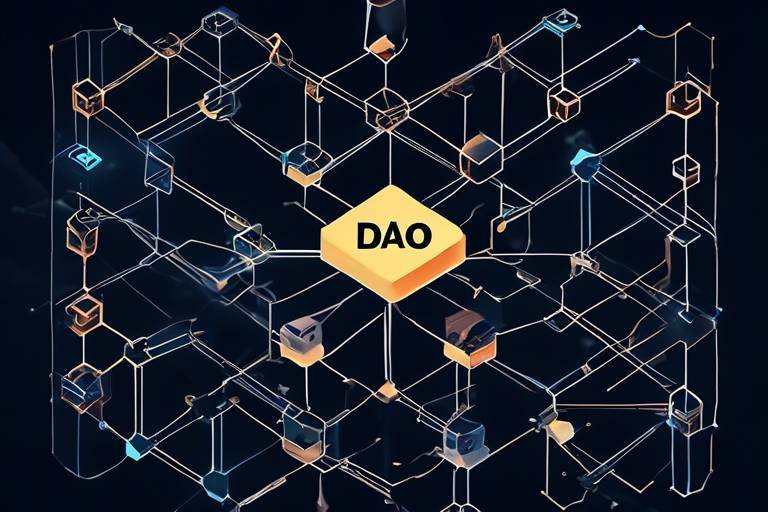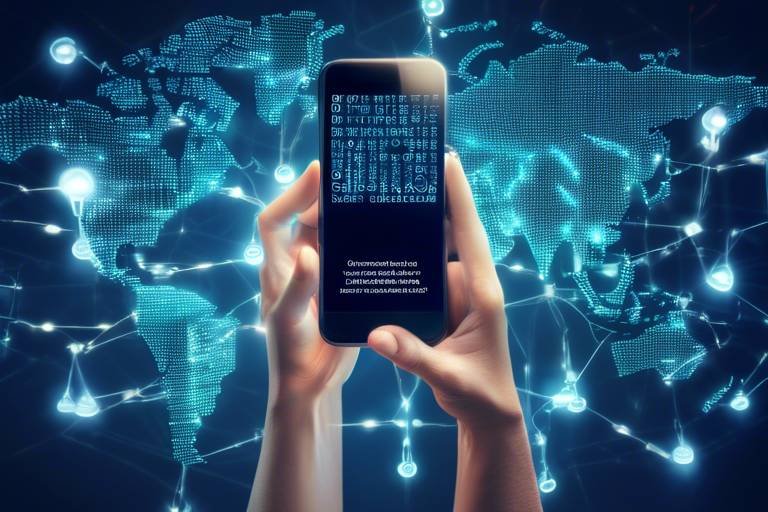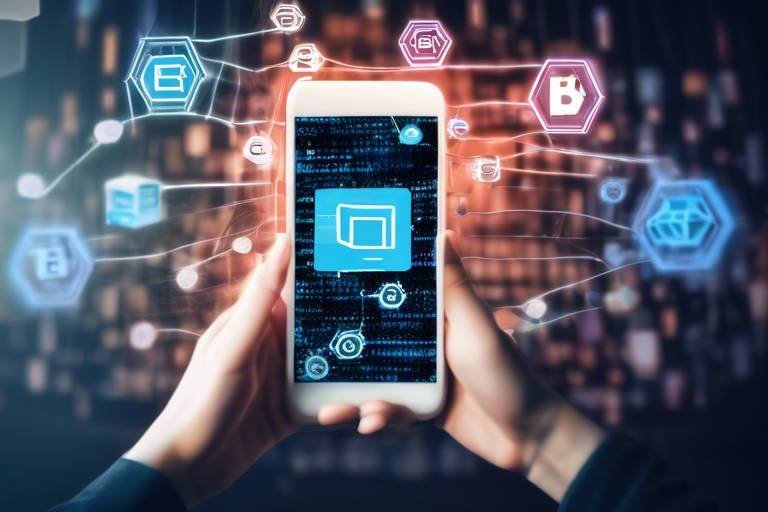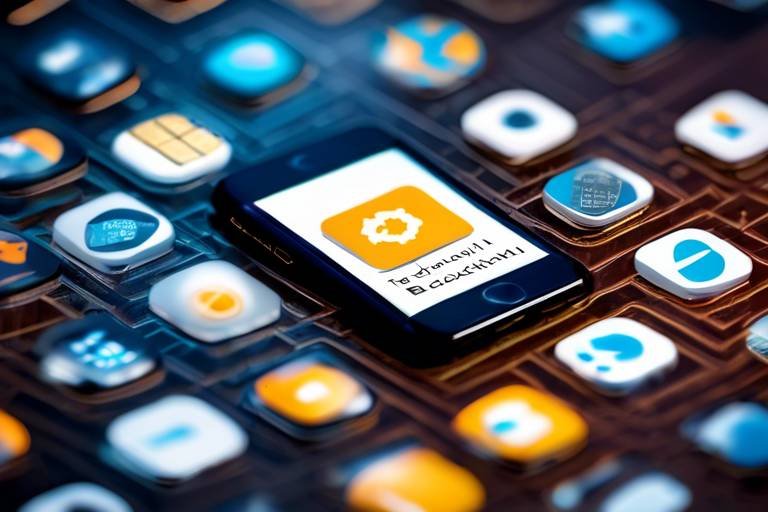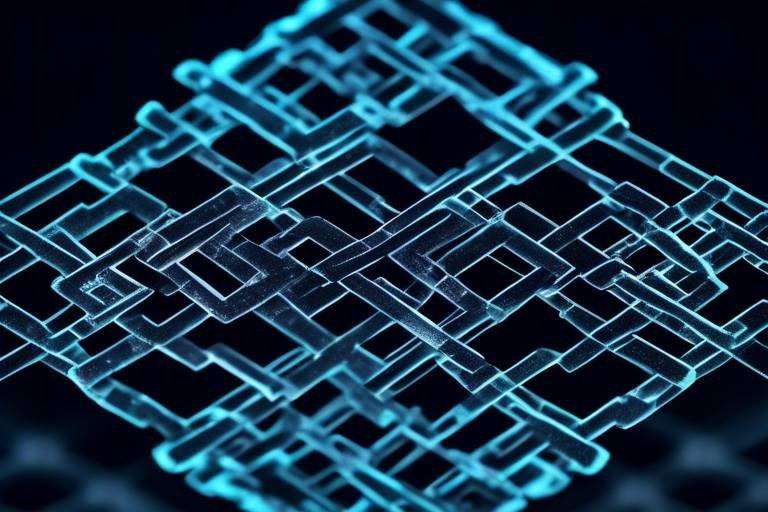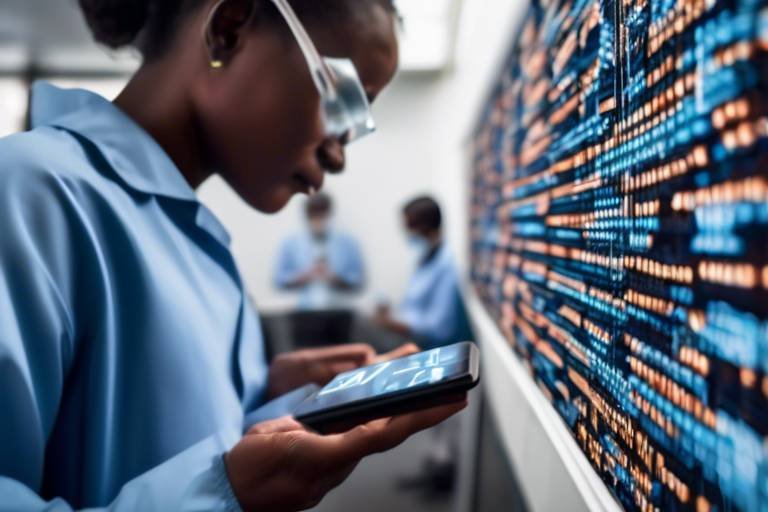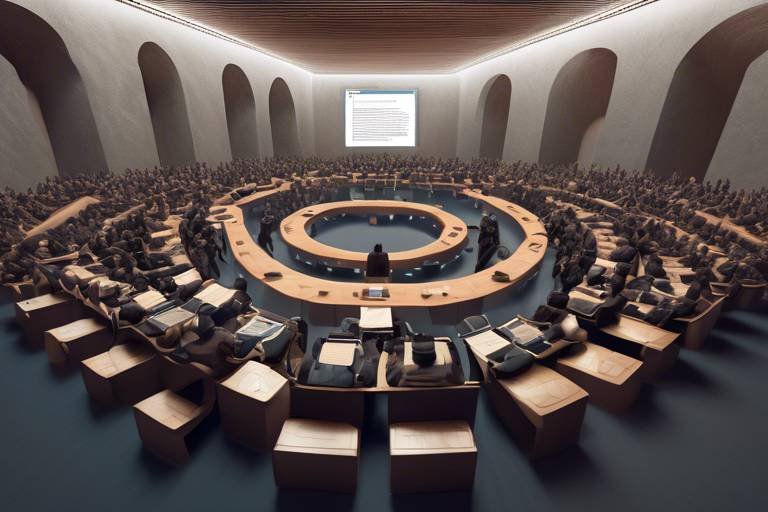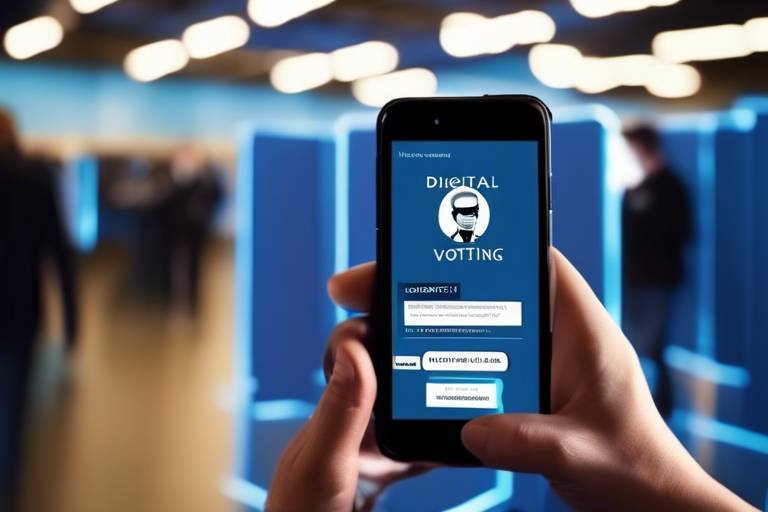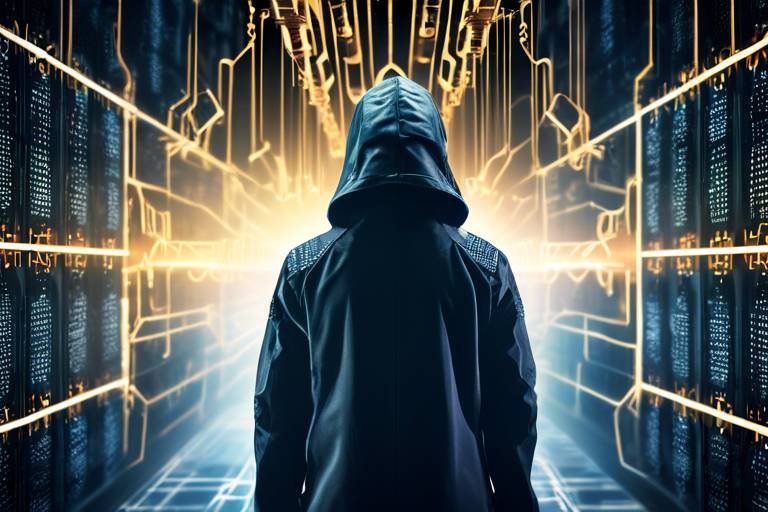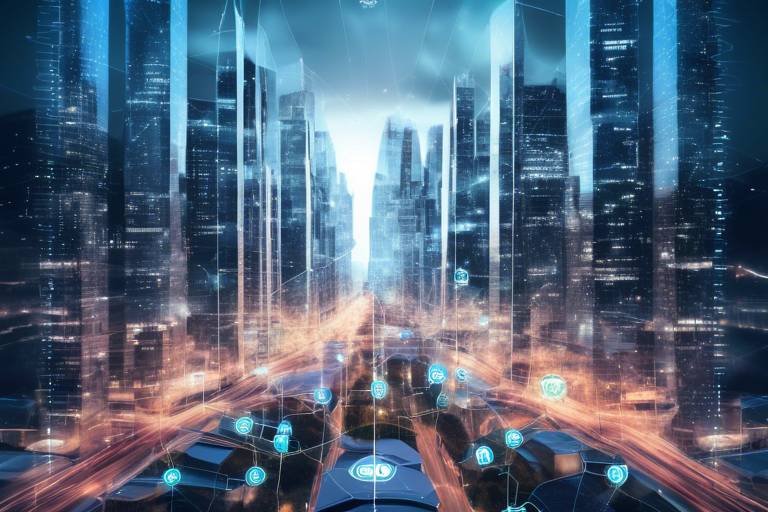How Blockchain is Enabling Decentralized Autonomous Organizations (DAOs)
In the rapidly evolving landscape of technology, Decentralized Autonomous Organizations (DAOs) are emerging as a revolutionary governance model. Imagine a world where organizations operate like a well-oiled machine, but without a CEO pulling the strings or a board of directors making all the decisions. Sounds intriguing, right? This is where blockchain technology steps in, acting as the backbone that supports the structure and function of DAOs. By leveraging the principles of decentralization and automation, DAOs not only empower individuals but also redefine how we think about organization and governance.
At the heart of DAOs lies the concept of self-governance. Each member has a voice, and decisions are made collectively, often through voting mechanisms that are transparent and secure. This is a stark contrast to traditional organizations where a few individuals hold significant power. The beauty of DAOs is that they operate on the principles of fairness and equity, allowing anyone with a stake in the organization to participate in its direction. With the aid of blockchain, every action taken is recorded, creating an immutable history that builds trust among members.
So, how does blockchain facilitate this transformation? Well, it provides a decentralized ledger that records all transactions and interactions within the organization. This ensures that all members can verify actions and decisions without relying on a central authority. The result? A more trustworthy environment where collaboration thrives. Furthermore, the use of smart contracts—self-executing contracts with the terms directly embedded in code—automates processes, making the organization not only efficient but also significantly reducing operational costs.
Moreover, the global reach of DAOs is astonishing. They break down geographical barriers, allowing individuals from diverse backgrounds to come together and collaborate on projects that matter to them. This inclusivity fosters a rich tapestry of ideas and perspectives, driving innovation and creativity. Imagine a group of artists from different continents collaborating on a digital art project, or a team of developers working on a groundbreaking software solution—all united under the umbrella of a DAO. The possibilities are endless!
However, it’s important to acknowledge that while DAOs present numerous advantages, they also come with their own set of challenges. The reliance on smart contracts can lead to vulnerabilities if not coded carefully. A bug in the code could potentially jeopardize the entire organization. Therefore, establishing clear coding standards and security protocols is crucial for the reliability of DAOs. As we navigate this new territory, it's essential to learn from the challenges and continuously adapt.
In conclusion, the intersection of blockchain technology and DAOs presents a fascinating glimpse into the future of organizational governance. With their ability to enhance transparency, reduce costs, and engage communities, DAOs are not just a trend; they are a paradigm shift in how we perceive organizations. As we continue to explore the potential applications of DAOs across various sectors—from finance to social impact—the future looks bright. Are you ready to be part of this revolutionary change?
- What is a DAO?
A DAO, or Decentralized Autonomous Organization, is an organization that operates without centralized control, using blockchain technology to manage resources and decision-making collectively.
- How does blockchain benefit DAOs?
Blockchain provides transparency, security, and immutability, which are essential for building trust among participants and ensuring the integrity of organizational operations.
- What are smart contracts?
Smart contracts are self-executing contracts with the terms directly written into code, enabling automated processes within DAOs and eliminating the need for intermediaries.
- What challenges do DAOs face?
DAOs face challenges such as security vulnerabilities in smart contracts and the need for clear coding standards to ensure reliability.
- Can anyone join a DAO?
Yes, DAOs are designed to be inclusive, allowing individuals from around the world to participate and contribute to decision-making processes.

Understanding DAOs
Decentralized Autonomous Organizations, or DAOs, represent a revolutionary shift in how we think about governance and organizational structure. Imagine a world where decisions are made collectively, without a central authority pulling the strings. This is precisely what DAOs aim to achieve. They operate on blockchain technology, which allows them to function transparently and autonomously. The core principle of a DAO is to empower its members to make decisions collaboratively, ensuring that everyone has a voice and a stake in the outcome.
At the heart of a DAO lies the concept of smart contracts. These self-executing contracts are programmed to carry out specific actions when certain conditions are met. For instance, if a proposal receives enough votes from the members, the smart contract automatically enforces the decision, removing the need for a middleman. This not only streamlines processes but also enhances trust among participants, as the rules are clear and immutable.
DAOs can take on various forms and functions, ranging from investment clubs to charitable organizations. They can be designed to manage funds, create projects, or even govern entire communities. The beauty of a DAO is that it can be tailored to meet the unique needs of its members. For example, a DAO focused on environmental initiatives might allocate resources to projects that align with its mission, while a DAO for tech enthusiasts may invest in innovative startups.
To better understand how DAOs operate, consider the following key features:
- Decentralization: No single entity controls the organization, promoting fairness and equality among members.
- Transparency: All transactions and decisions are recorded on the blockchain, making them accessible and verifiable by anyone.
- Autonomy: DAOs function independently through smart contracts, which execute actions based on predefined rules without human intervention.
This innovative approach to organization raises several questions about accountability and governance. How do members ensure that decisions reflect the collective will? What happens if a member acts against the interests of the group? These are crucial considerations that DAOs must address as they evolve. However, the potential for increased engagement and community-driven initiatives makes DAOs an exciting frontier in the realm of organizational governance.
As we continue to explore the landscape of DAOs, it’s essential to recognize their transformative potential. They not only challenge traditional business models but also offer a new way to think about collaboration and shared ownership in our increasingly digital world.

The Role of Blockchain in DAOs
Blockchain technology is the backbone of Decentralized Autonomous Organizations (DAOs), acting as the invisible thread that weaves together the various components of these innovative entities. Imagine a world where organizations operate without a central authority, where every member has a say, and where decisions are made transparently and fairly. This is precisely what blockchain enables for DAOs. By utilizing a distributed ledger, blockchain ensures that all transactions and decisions are recorded in a way that is both secure and immutable, meaning once something is on the blockchain, it cannot be altered or deleted. This feature is crucial because it builds trust among participants, who can independently verify the integrity of the organization’s operations.
At its core, blockchain provides three essential qualities that empower DAOs: transparency, security, and immutability. These qualities work together to create an environment where members can interact and collaborate without fear of manipulation or fraud. For instance, every decision made within a DAO can be traced back to its origin, allowing members to see how and why choices were made. This level of visibility is a game-changer in governance, as it fosters accountability and encourages active participation.
Moreover, blockchain technology eliminates the need for intermediaries. Traditionally, organizations rely on managers or executives to make decisions and oversee operations. This can lead to inefficiencies, miscommunication, and even corruption. However, in a DAO, smart contracts execute decisions automatically based on pre-set rules, which are coded into the blockchain. This means that once a proposal is approved by the community, the smart contract takes over, ensuring that the decision is implemented without any delays or human interference.
Let’s dive a bit deeper into smart contracts, as they are a pivotal element in the functionality of DAOs. Think of a smart contract as a digital vending machine. You put in your money, select your item, and the machine dispenses it without needing a cashier. Similarly, smart contracts execute actions when certain conditions are met. For example, if a proposal to fund a project receives enough votes, the smart contract automatically releases the funds to the project team. This automation not only speeds up processes but also reduces the potential for disputes and misunderstandings.
The advantages of smart contracts are numerous. They enhance operational efficiency by automating repetitive tasks, which frees up time for members to focus on more strategic initiatives. Additionally, smart contracts help in ensuring compliance with the rules set forth by the DAO, as they are programmed to adhere strictly to these guidelines. Furthermore, by minimizing human error, smart contracts contribute to the overall reliability of the organization.
However, it's essential to recognize that smart contracts are not without their challenges. Security vulnerabilities can exist, particularly if the code is not written with precision. A flaw in the code could lead to unintended consequences, potentially jeopardizing the entire DAO. Therefore, establishing clear coding standards and conducting thorough audits is vital to maintaining the trust and reliability of the organization.
In summary, blockchain technology is the cornerstone that supports the structure of DAOs. By providing a transparent, secure, and immutable environment, it enables decentralized decision-making and operational efficiency. As DAOs continue to grow in popularity, understanding the role of blockchain will be crucial for anyone looking to participate in this new wave of organizational governance.
- What is a DAO? A DAO, or Decentralized Autonomous Organization, is an organization that operates without centralized control, using blockchain technology to manage decision-making and resources collectively.
- How does blockchain enhance DAOs? Blockchain enhances DAOs by providing transparency, security, and immutability, which are essential for building trust among participants.
- What are smart contracts? Smart contracts are self-executing contracts with the terms directly written into code, enabling automated processes within DAOs.
- What challenges do smart contracts face? Smart contracts can face challenges such as security vulnerabilities and the need for clear coding standards, which can impact the reliability of DAOs.

Smart Contracts Explained
Smart contracts are a revolutionary concept in the realm of blockchain technology, acting as the backbone of Decentralized Autonomous Organizations (DAOs). Imagine a contract that executes itself without the need for a middleman—this is the essence of smart contracts. They are self-executing agreements where the terms of the contract are directly embedded into code on the blockchain. This means that once the conditions of the contract are met, the contract automatically executes the agreed-upon actions, all without human intervention.
The beauty of smart contracts lies in their automation and transparency. For instance, if a DAO decides to distribute funds to a project upon reaching a certain milestone, a smart contract can be programmed to release those funds automatically when the milestone is verified on the blockchain. This eliminates the need for trust in a third party, as the contract operates on the principle of code, not trust.
Here’s how smart contracts contribute to the functioning of DAOs:
- Automation: They automate processes, reducing the time and effort required for manual execution.
- Cost-Effectiveness: By removing intermediaries, smart contracts can significantly lower transaction costs.
- Accuracy: With clear code and predefined rules, the likelihood of human error is minimized.
However, it's crucial to understand that smart contracts are not without their challenges. They are only as good as the code they are written in. If there are bugs or vulnerabilities in the code, the entire contract can be compromised. This is why the importance of auditing and following clear coding standards cannot be overstated. As DAOs grow and evolve, so too will the complexity of their smart contracts, necessitating continuous improvements in security and reliability.
In summary, smart contracts serve as the digital backbone for DAOs, ensuring that operations are conducted smoothly, efficiently, and transparently. They represent a significant leap forward in how organizations can operate, moving away from traditional models and embracing a new era of decentralized governance.

Benefits of Smart Contracts
Smart contracts are revolutionizing the way organizations operate by automating processes that traditionally required human intervention. Imagine a world where transactions happen seamlessly, without the need for middlemen. That’s the power of smart contracts! They are not just lines of code; they are the backbone of Decentralized Autonomous Organizations (DAOs), enabling them to function efficiently and effectively.
One of the most significant advantages of smart contracts is their ability to enhance efficiency. By automating routine tasks, these contracts reduce the time and effort needed to execute agreements. For instance, consider a scenario where a group of individuals wants to pool their funds for a community project. A smart contract can automatically distribute funds based on predefined conditions, eliminating delays and ensuring that everyone receives their share promptly.
Moreover, smart contracts lead to cost reductions. Traditional contracts often involve legal fees, administrative costs, and other overheads associated with human management. With smart contracts, these costs are significantly minimized. Organizations can redirect these savings towards growth and innovation instead of spending them on unnecessary bureaucracy.
Another critical benefit is compliance and reliability. Smart contracts execute automatically when conditions are met, which means that there’s no room for ambiguity or misinterpretation. This feature is crucial for DAOs, where trust is paramount. Participants can rest assured that the rules are enforced consistently, fostering a culture of accountability within the organization.
However, it’s essential to note that while smart contracts offer these benefits, they are not without challenges. Issues like security vulnerabilities and the importance of clear coding standards can impact their reliability. Therefore, organizations must invest in rigorous testing and auditing processes to ensure their smart contracts are secure and function as intended.
In summary, the benefits of smart contracts are numerous and transformative. They not only streamline operations but also foster a trustworthy environment in which DAOs can thrive. By leveraging this technology, organizations can achieve unprecedented levels of efficiency, cost-effectiveness, and reliability.
- What are smart contracts? Smart contracts are self-executing contracts with the terms of the agreement directly written into code, allowing for automated execution without intermediaries.
- How do smart contracts enhance efficiency? They automate processes, reducing the time and effort needed to fulfill agreements, which leads to quicker transactions.
- Are smart contracts secure? While they offer security benefits, they are also vulnerable to coding errors and security breaches, making thorough testing essential.
- Can smart contracts reduce costs? Yes, by eliminating the need for intermediaries and reducing administrative overhead, smart contracts can significantly lower operational costs.
- What role do smart contracts play in DAOs? They are fundamental to the operation of DAOs, enabling automated decision-making and ensuring compliance with organizational rules.

Challenges of Smart Contracts
While smart contracts are often hailed as the backbone of Decentralized Autonomous Organizations (DAOs), they are not without their challenges. These self-executing contracts, which run on blockchain technology, can revolutionize the way we conduct agreements, but they also come with a set of hurdles that need careful consideration. One of the primary issues is security vulnerabilities. Just like a house built on a shaky foundation, a smart contract can be susceptible to hacks and exploits if not properly designed. The infamous DAO hack in 2016 serves as a stark reminder of how a flaw in the code can lead to significant financial losses.
Another challenge lies in the complexity of coding. Writing smart contracts requires a deep understanding of programming languages like Solidity, which is often beyond the reach of average users. This complexity can lead to mistakes that could have dire consequences. Imagine trying to assemble a piece of IKEA furniture without the manual; you might end up with a wobbly chair instead of a sturdy one. Similarly, poorly coded smart contracts can result in unexpected behaviors, leading to disputes among members of a DAO.
Moreover, the need for clear coding standards is crucial. Without universally accepted guidelines, developers might implement different practices, leading to inconsistencies and potential conflicts. It’s akin to trying to play a game with friends but each person having their own set of rules; it can quickly become chaotic. Therefore, establishing a standard for writing and auditing smart contracts is essential to ensure reliability and foster trust among DAO members.
Additionally, the lack of legal recognition poses a significant hurdle. Many jurisdictions still do not recognize smart contracts as legally binding, which can create uncertainty for participants. The absence of a legal framework means that if something goes wrong, there may be no recourse for the parties involved. This uncertainty can deter potential members from engaging with DAOs, fearing that their interests may not be adequately protected.
In summary, while smart contracts hold immense potential for enhancing the efficiency and transparency of DAOs, addressing these challenges is crucial for their widespread adoption. By focusing on security, simplifying coding practices, establishing clear standards, and advocating for legal recognition, we can pave the way for a more robust and reliable framework that will empower DAOs to flourish in the future.
- What are smart contracts? Smart contracts are self-executing contracts with the terms of the agreement directly written into code, allowing for automated processes without the need for intermediaries.
- What are the main challenges associated with smart contracts? The main challenges include security vulnerabilities, complexity in coding, lack of clear standards, and insufficient legal recognition.
- How can we improve the reliability of smart contracts? Improving reliability can be achieved by focusing on security audits, simplifying coding practices, and establishing clear coding standards.
- Are smart contracts legally binding? The legal status of smart contracts varies by jurisdiction, and many places still do not recognize them as legally binding.

Governance Models in DAOs
Governance models in Decentralized Autonomous Organizations (DAOs) are the backbone of how these innovative entities operate and make decisions. Unlike traditional organizations that rely on hierarchical structures, DAOs empower their members to participate directly in governance through various mechanisms. This democratization of decision-making is one of the key features that set DAOs apart in the modern landscape of organizational management.
At the heart of DAO governance are token-based voting systems. In these models, members hold tokens that represent their stake in the organization. The more tokens a member possesses, the greater their influence on decisions. This system not only incentivizes members to engage actively but also aligns their interests with the success of the DAO. For instance, if a member wants to propose a new project or initiative, they can submit their proposal to be voted on by other token holders. This process ensures that decisions reflect the collective will of the community, rather than being dictated by a select few.
Another intriguing governance model is the reputation system. In this approach, members earn reputation points based on their contributions and participation within the DAO. The more active and valuable a member is, the more reputation they accumulate, which can translate into greater voting power or influence in decision-making processes. This model not only encourages participation but also fosters a sense of accountability and responsibility among members, as they strive to enhance their reputation through meaningful contributions.
However, these governance models are not without their challenges. For example, token-based voting can sometimes lead to centralization risks, where a small number of token holders control the majority of votes. This can undermine the very principles of decentralization that DAOs aim to uphold. Similarly, reputation systems can become complex and may inadvertently favor long-term members over newcomers, potentially stifling fresh ideas and perspectives.
| Governance Model | Description | Pros | Cons |
|---|---|---|---|
| Token-based Voting | Members vote based on the number of tokens they hold. |
|
|
| Reputation System | Members earn points based on contributions and participation. |
|
|
In conclusion, governance models in DAOs combine innovative frameworks that encourage participation and collaboration. By leveraging token-based voting and reputation systems, DAOs empower their members to shape the direction of the organization. Nevertheless, it is crucial to remain vigilant about the potential pitfalls of these models to ensure that the core values of decentralization and inclusivity are upheld. As DAOs continue to evolve, we can expect to see new governance structures emerge, further enhancing the effectiveness and appeal of these pioneering organizations.
- What is a DAO? A DAO, or Decentralized Autonomous Organization, is an organization represented by rules encoded as a computer program that is transparent, controlled by organization members and not influenced by a central government.
- How do DAOs make decisions? DAOs make decisions through governance models such as token-based voting and reputation systems, allowing members to participate directly in the decision-making process.
- What are the benefits of DAOs? DAOs offer increased transparency, reduced operational costs, enhanced member engagement, and a global reach that traditional organizations often lack.

Benefits of DAOs
Decentralized Autonomous Organizations (DAOs) are not just a buzzword; they represent a revolutionary shift in how we think about governance and collaboration. One of the most compelling is their inherent transparency. Unlike traditional organizations, where decision-making processes can often be shrouded in secrecy, DAOs operate on a blockchain, allowing every transaction and decision to be publicly visible. This transparency fosters trust among members, as everyone can verify actions taken within the organization without needing to rely on a central authority.
Moreover, DAOs significantly reduce operational costs. Traditional organizations often have layers of management and bureaucracy that can lead to inefficiencies and increased expenses. In contrast, DAOs streamline processes through the use of smart contracts, which automate many tasks that would typically require human intervention. This automation not only saves money but also allows organizations to allocate resources more effectively, channeling funds directly into projects that matter most to members.
Another remarkable aspect of DAOs is their ability to enhance member engagement. In a DAO, every member has a voice, often facilitated through token-based voting systems. This means that decisions are made collectively, reflecting the true will of the community rather than a select few. Imagine being part of a team where your opinion genuinely counts—this is the essence of DAOs. Members are more likely to be invested in the organization's success when they have a direct say in its direction, leading to a more vibrant and active community.
Furthermore, the global reach of DAOs is a game-changer. By operating on a decentralized network, DAOs can attract participants from all corners of the globe, breaking down geographical barriers that often limit traditional organizations. This diversity not only enriches the decision-making process but also opens doors to innovative ideas and perspectives that might not have been considered otherwise. The ability to collaborate with individuals from different cultures and backgrounds can lead to unique solutions and foster a sense of shared purpose.
In summary, the benefits of DAOs are profound and multifaceted. From increased transparency and reduced costs to enhanced member engagement and global participation, DAOs are paving the way for a new era of organizational governance. As they continue to evolve, we can expect to see even more innovative applications that leverage these advantages, making DAOs an exciting frontier in the world of collaboration and decision-making.
- What are the main advantages of DAOs? DAOs provide transparency, reduce operational costs, enhance member engagement, and allow for global participation.
- How do DAOs ensure transparency? DAOs operate on blockchain technology, which allows all transactions and decisions to be publicly visible and verifiable.
- Can anyone join a DAO? Yes, DAOs are designed to be inclusive, allowing individuals from around the world to participate and contribute.
- What role do smart contracts play in DAOs? Smart contracts automate processes and decision-making, reducing the need for intermediaries and minimizing human error.

Community Engagement
In the realm of Decentralized Autonomous Organizations (DAOs), is not just a buzzword; it’s the lifeblood that fuels these innovative entities. Imagine a vibrant ecosystem where every member has a voice, where their opinions matter, and where they actively contribute to the organization’s direction. This is the essence of community engagement in DAOs. Unlike traditional organizations that often operate in silos, DAOs thrive on collaboration and inclusivity, inviting members to participate in decision-making processes. It’s like being part of a large family where everyone’s input shapes the future.
One of the most fascinating aspects of DAOs is how they leverage technology to enhance community engagement. Through platforms built on blockchain, members can easily communicate, propose changes, and vote on critical issues. This transparency not only fosters trust but also encourages individuals to take an active role in shaping the organization. For instance, when a proposal is put forward, members can discuss its merits openly, debate its implications, and ultimately vote on its adoption. This level of participation can be likened to a town hall meeting, but on a global scale, where geographical boundaries fade away.
Moreover, community engagement in DAOs often leads to a sense of shared ownership. Members don’t just feel like passive participants; they become stakeholders in the organization’s success. This ownership is typically represented through tokens, which can grant voting rights and influence over the organization’s direction. When members see their contributions making a tangible impact, it ignites a passion that drives further participation. Active engagement can result in innovative ideas, collaborative projects, and a thriving community that continually evolves.
However, fostering such engagement is not without its challenges. DAOs must create an environment that encourages participation from all members, ensuring that everyone feels valued and heard. This can involve implementing systems that reward active contributors or providing educational resources to help members understand how to engage effectively. Ultimately, the goal is to cultivate a community where every voice matters, and every contribution is recognized.
In summary, community engagement within DAOs is a powerful force that transforms how organizations operate. By embracing a culture of collaboration and inclusivity, DAOs not only enhance their decision-making processes but also build a loyal and passionate community. As we look to the future, it’s clear that the organizations that prioritize community engagement will be the ones that thrive in this new decentralized landscape.
- What is a DAO? A DAO, or Decentralized Autonomous Organization, is an organization that operates without centralized control, using smart contracts and blockchain technology for governance and decision-making.
- How do DAOs engage their community? DAOs engage their community by allowing members to participate in decision-making processes, propose changes, and vote on important issues, fostering a sense of ownership and collaboration.
- What are the benefits of community engagement in DAOs? Community engagement leads to increased transparency, innovation, and a stronger sense of belonging among members, ultimately enhancing the effectiveness of the organization.
- Can anyone join a DAO? Yes, most DAOs are open to anyone who wants to participate, although some may have specific requirements or membership processes.

Global Reach
The decentralized nature of Decentralized Autonomous Organizations (DAOs) allows them to transcend traditional geographical boundaries, making them truly global entities. Imagine a world where anyone, regardless of their location, can participate in decision-making processes that affect their communities or investments. This is not just a dream; it’s the reality that DAOs are creating. With the power of blockchain technology, DAOs enable individuals from different corners of the globe to come together, collaborate, and innovate without the constraints of centralized systems.
One of the most exciting aspects of DAOs is their ability to democratize participation. For instance, a DAO focused on environmental conservation could attract members from diverse backgrounds—scientists, activists, investors, and everyday citizens—all contributing their unique perspectives and expertise. This collaborative spirit enriches the decision-making process, leading to more robust and inclusive outcomes.
Furthermore, DAOs can operate 24/7, allowing for continuous engagement and participation. Unlike traditional organizations that may have fixed hours or geographical limitations, DAOs are always 'open for business.' This means that individuals can join discussions, vote on proposals, and contribute to projects at their convenience. The result? A vibrant, active community that thrives on collaboration and shared goals.
As DAOs continue to gain traction, their global reach will only expand. Here are a few key factors contributing to this phenomenon:
- Accessibility: With just an internet connection, anyone can participate in a DAO, breaking down barriers that often exclude marginalized groups.
- Inclusivity: DAOs encourage diverse participation, allowing voices from various cultures and backgrounds to be heard and valued.
- Innovation: The global pool of talent and ideas fosters innovation, leading to creative solutions that might not emerge in traditional settings.
As we look to the future, the global reach of DAOs is set to revolutionize not just how organizations operate, but also how we think about collaboration and community. The potential for cross-border partnerships and initiatives is immense, paving the way for a more interconnected world where everyone has a stake in the outcomes.
- What is a DAO? A DAO is a Decentralized Autonomous Organization that operates without centralized control, using smart contracts and blockchain technology for governance.
- How do DAOs ensure transparency? DAOs utilize blockchain technology, which provides an immutable and transparent record of all transactions and decisions made within the organization.
- Can anyone join a DAO? Yes! Most DAOs are open to anyone with an internet connection, promoting inclusivity and global participation.
- What are the benefits of participating in a DAO? Participants can engage in decision-making, collaborate with diverse members, and contribute to innovative projects while enjoying the benefits of a decentralized structure.

Future of DAOs
This article explores the transformative role of blockchain technology in facilitating the emergence and operation of Decentralized Autonomous Organizations (DAOs), highlighting their features, benefits, and future implications.
Decentralized Autonomous Organizations (DAOs) represent a new governance model that operates without centralized control, utilizing smart contracts and blockchain technology to manage decision-making and resources collectively.
Blockchain serves as the foundational technology for DAOs, providing transparency, security, and immutability, which are essential for building trust among participants and ensuring the integrity of organizational operations.
Smart contracts are self-executing contracts with the terms directly written into code, enabling automated processes within DAOs and eliminating the need for intermediaries in executing agreements.
Smart contracts enhance efficiency and reduce costs by automating tasks, ensuring compliance, and minimizing human error, which is crucial for the smooth functioning of DAOs.
Despite their advantages, smart contracts face challenges such as security vulnerabilities and the need for clear coding standards, which can impact the reliability of DAOs.
DAOs implement various governance models, such as token-based voting and reputation systems, to facilitate decision-making processes that reflect the collective will of their members.
DAOs offer numerous advantages, including increased transparency, reduced operational costs, and enhanced member engagement, making them an attractive alternative to traditional organizational structures.
DAOs foster a sense of community and collaboration among members, encouraging active participation and shared ownership in decision-making processes and project initiatives.
The decentralized nature of DAOs allows them to operate globally, breaking down geographical barriers and enabling diverse participation from individuals around the world.
The future of DAOs looks incredibly promising, with potential applications across various sectors, including finance, governance, and social impact. As technology continues to evolve, DAOs are expected to adapt, embracing new challenges and opportunities that come their way.
Imagine a world where organizations are run without traditional hierarchies, where decisions are made collectively, and everyone has a voice. DAOs are paving the way for this reality. As they grow, we can anticipate several exciting trends:
- Increased Integration with Traditional Businesses: Traditional companies may start to adopt DAO-like structures to enhance transparency and stakeholder engagement.
- Enhanced Regulatory Frameworks: As DAOs gain popularity, regulatory bodies might create guidelines to ensure their operation within legal boundaries, fostering a safer environment for participants.
- Interoperability with Other Blockchains: Future DAOs may operate across multiple blockchain networks, allowing for greater flexibility and collaboration.
Furthermore, the rise of DAOs could lead to a shift in how we view ownership and governance. With the power of blockchain, members can have real-time access to information and participate in decision-making processes that were once reserved for a select few. This democratization of power not only enhances trust but also encourages innovation.
In conclusion, the future of DAOs is not just about technology; it’s about redefining how we organize ourselves. As we move forward, we can expect to see a profound transformation in various sectors, driven by the principles of decentralization, transparency, and community engagement.
A DAO, or Decentralized Autonomous Organization, is an organization represented by rules encoded as a computer program that is transparent, controlled by organization members and not influenced by a central government.
DAOs operate on blockchain technology, using smart contracts to enforce rules and execute decisions based on member votes, ensuring that all actions are recorded and verifiable.
DAOs provide benefits such as increased transparency, reduced operational costs, and enhanced member engagement, making them appealing alternatives to traditional organizational structures.
DAOs face challenges including security vulnerabilities, the complexity of smart contracts, and the need for clear governance models to ensure effective decision-making.
Frequently Asked Questions
- What is a Decentralized Autonomous Organization (DAO)?
A Decentralized Autonomous Organization (DAO) is a new type of organization that operates without centralized control. Instead, it uses blockchain technology and smart contracts to manage decision-making and resources collectively. Think of it as a digital cooperative where everyone has a say!
- How does blockchain technology benefit DAOs?
Blockchain technology provides the backbone for DAOs, offering transparency, security, and immutability. This means that all transactions and decisions are recorded and cannot be altered, which builds trust among participants. It’s like having an unchangeable ledger that everyone can see, ensuring fairness and accountability.
- What are smart contracts and how do they work in DAOs?
Smart contracts are self-executing contracts with the terms directly written into code. They automate processes within DAOs, allowing for seamless execution of agreements without intermediaries. Imagine them as digital vending machines – you input your choice, and the machine delivers without needing a cashier!
- What are the advantages of using smart contracts?
Smart contracts enhance efficiency, reduce costs, and minimize human error. By automating tasks, they ensure compliance and streamline operations, which is vital for the smooth running of DAOs. Just think about how much time and resources you could save by automating repetitive tasks!
- What challenges do smart contracts face?
Despite their benefits, smart contracts can have security vulnerabilities and require clear coding standards to ensure reliability. If the code isn’t written correctly, it could lead to unexpected outcomes. It’s crucial to approach smart contract development with caution, much like building a house on solid foundations!
- How do DAOs make decisions?
DAOs utilize various governance models, such as token-based voting and reputation systems, to facilitate decision-making. This allows members to vote on proposals, reflecting the collective will of the community. It’s like a democratic system where every voice matters!
- What are the benefits of being part of a DAO?
Joining a DAO offers increased transparency, reduced operational costs, and enhanced member engagement. Members actively participate in decision-making processes, fostering a sense of community and shared ownership. It’s a collaborative environment where everyone can contribute and feel valued!
- Can DAOs operate globally?
Absolutely! The decentralized nature of DAOs allows them to operate across borders, breaking down geographical barriers. This means individuals from all around the world can participate and collaborate, creating a diverse and inclusive environment.
- What does the future hold for DAOs?
The future of DAOs looks bright, with potential applications in various sectors like finance, governance, and social impact. As they continue to evolve, DAOs will adapt to new challenges and opportunities, paving the way for innovative organizational structures.

